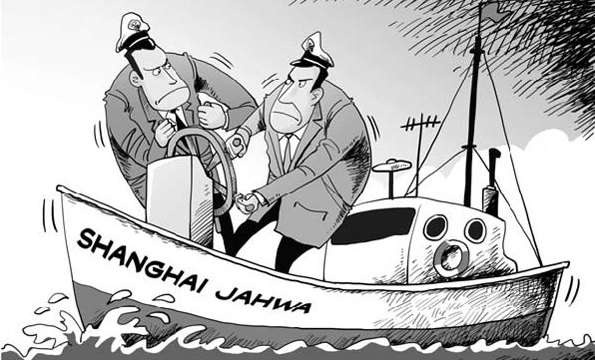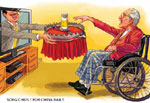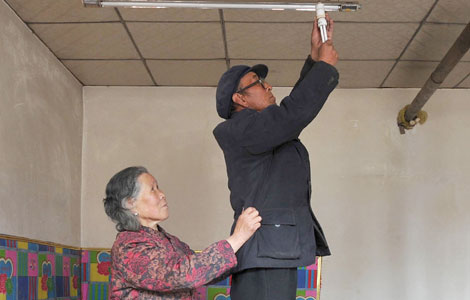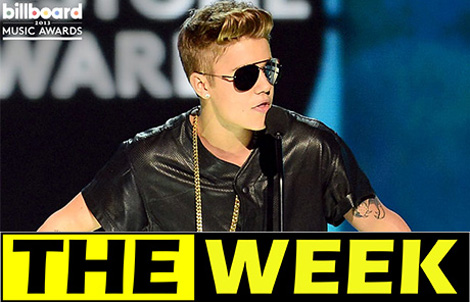Argument prompts introspection
Updated: 2013-05-27 05:34
(China Daily)
|
|||||||||||

Management | Yang Ziman
How much is an apology worth? Ge Wenyao, chairman of Shanghai Jahwa United Co, just paid more than 300 million yuan ($50 million) to make one.
It was an expensive lesson for not only Shanghai Jahwa United, a leading Chinese personal care product maker listed on the Shanghai Stock Exchange. It was also a lesson for all who have an interest or are keen to take an interest in the Chinese capital market. The market is still digesting the lesson.
Shanghai-based Jahwa United, one of the leading Chinese companies in the industry, was in trouble when Ge was dismissed on May 11 by China Ping An Trust & Investment Co, affiliated to Ping An Insurance (Group) Co, which owns 20 percent of Jahwa United's stock equity. Ge responded to his sacking on May 13 by openly criticizing Ping An in a personal blog for obstructing his ambitions to develop the company.
On his personal Weibo, the Chinese version of Twitter, Ge complained about Ping An's shortsightedness, saying it broke its promise not to interfere with the management when it bought Jahwa United's shares.
In response, Ping An forced Ge to step down as chairman and chief executive officer of Shanghai Jahwa (Group) Co, of which Ping An owned 100 percent of the equity, for alleged misuse of the company's capital, claiming it had received staff reports since March that Jahwa management was keeping some off-the-book accounts and misusing funds. Shanghai Jahwa (Group) Co is the parent company of the listed Shanghai Jahwa United, where Ge is also chairman.
On May 13, two days after Ping An's announcement was made, Jahwa United's share tumbled 8 percent on the Shanghai Stock Exchange before its trading was suspended the following day.
A total of 4.89 billion yuan in Jahwa United's market capitalization was lost as a result of the fight between the majority shareholder and the chief executive. Other shareholders raised an outcry.
Many shareholders seemed to take the side of Ge because he had guided the company's past growth in competition with global brands and, as a result, had earned a reputation of being a capable businessman.
They criticized Ping An for being brash in its sudden decision and being arrogant toward shareholders' interests.
At the moment, no one knows what the precise consequences are of a fight between a strong-willed chairman and a majority shareholder backed by a major financial house in China, particularly one easily irritated by anyone who dares to show less than total respect for its power.
But many argue there is no need to worry. A capital market with Chinese characteristics has a mechanism to prevent a clash of titans. And they add the government is not afraid of being interventionist.
The State-owned Assets Supervision and Administration Commission of Shanghai municipal government (Shanghai SASAC), which used to own Shanghai Jahwa Group before it transferred its entire holding to Ping An in 2011, stepped in.
"Shanghai SASAC has told me to keep silent," Ge told the Guangzhou-based Time Weekly on May 14. The newspaper also cited an anonymous insider saying that Ge had been seeking the help of Shanghai SASAC since the conflict flared up. However, because Ge had used harsh words against the commission on several occasions, leaders of the asset management authority were not inclined to treat him too kindly.
"Shanghai SASAC asked Ge to keep a low profile and the local media not to sensationalize the news," said the insider. Consequently, Ge, who used Weibo to broadcast his opinions, has stopped posting messages on his account since Shanghai SASAC talked to him.
"It is the last resort to get Shanghai SASAC involved," said a person who has been following the commission's response. "Because Ge holds little of Jahwa United's stocks, he has no say in front of major shareholders. The only things he could count on are the promises made by Ping An at the point of purchase and the fact that the Shanghai government does not want to see Jahwa fail."
On May 16, Jahwa United held a shareholders' meeting to put an end to the dispute. At the meeting, Ge first apologized for mishandling the relation with Ping An and causing losses to shareholders. He then showed a willingness to cooperate with Ping An for the well-being of Jahwa United. "The brand is the most important thing. Anything else does not make much difference to me," he said.
A representative of Ping An said at the meeting that they shared a common goal of turning Jahwa United into a better company for all shareholders and would not waver from its current strategy. The dispute ended in reconciliation. Ge will no longer work as chairman and CEO for Shanghai Jahwa Group, the parent company, but has retained his chairman position at Shanghai Jahwa United, the listed subsidiary.
The reconciliation pushed Jahwa United's stock up by 3.32 percent to 65.08 yuan by the end of trading on May 16, adding a total of 376 million yuan to its value.
However, should a government agency that formerly owned a company's equity step in to mediate over internal strife? What right does the government have to do so? Opinions are divided.
Like it or not, the simple reality is that the government administrative offices sometimes do act as lawyers and courts to mediate within disputing organizations in order to protect general order and stability.
This time, the Shanghai SASAC performed very well by building bridges between the two sides in the dispute and engineering their reconciliation before the company hit bigger trouble.
Other people, however, do not think Shanghai SASAC did the right thing.
Zhou Junsheng, a financial commentator, wrote in an article in Securities Times on May 20 that the only connection the commission has with Jahwa United is through its second largest shareholder, Shanghai Jiushi Corp, which is owned by the Shanghai municipal government, which holds just 4.9 percent of the equity.
As a result, Zhou added, Shanghai SASAC has little power to exert any significant influence on major shareholders and the board. The moment when the commission sold Jahwa Group to Ping An in 2011, it transferred all the decision-making rights concerning the company as well as Jahwa United, its subsidiary, to Ping An.
Zhou said that apparently Shanghai SASAC has used administrative power to intervene in the affair. It seems to have been quite effective in mitigating Ge's anger, tone down the media hype and get everyone to sit down at the table to talk. However, the incident has strengthened the government's stance in meddling with economic affairs.
The reason for Shanghai SASAC's interference, said Zhou, was because of its worry that if Ge is kicked out, Ping An might sell Jahwa Group to a foreign-owned enterprise and ruin the national brand. Therefore the government's involvement was timely and justified. He said such fears are groundless for two reasons.
First, Ping An may not find a better suited person to succeed Ge.
Second, whether Jahwa prospers or perishes depends not upon the government's protection but the quality of its products and managerial expertise.
Therefore, Shanghai SASAC should leave it to the company to settle any internal disputes, said Zhou.
According to an interview given by Ge to China Entrepreneur, a Beijing magazine, in December 2011, it was because of the desire to reduce governmental interference that Ge actively pushed for the deal - State ownership had put too many restrictions on his grand plan of turning Jahwa Group into an international fashion franchise with various product lines.
Also, limitations on bonuses for managers, which then did not exceed 30 percent of annual salary, stunted his motivation to work harder, Ge told China Entrepreneur.
An Hui, an analyst with Securities Times in Beijing, said in an article published on May 22 that it is common for major shareholders and managers to hold different opinions. However, they eventually reach a consensus after making compromises. That happens because of the invisible hand of the market at work to balance everyone's interests.
The visible hand of the government, added An, only has to provide a fair and sound environment for the enterprises to grow and guard against monopoly without getting involved in the competition or the internal disputes of any particular company. In other words, the government should manage from a macro perspective instead of a micro one.
Contact the writer at yangziman@chinadaily.com.cn
(China Daily 05/27/2013 page20)
Today's Top News
Germany to pay $1b for ageing Holocaust victims
Beijing seeks cooperation with US on cyberattacks
China to speed up service growth
Infant's fall in pipe probed
Developer invests $1.5b in London
Schoolchildren taught to avoid sexual assault
Traffickers await appeal verdict
Female condoms, a new choice
Hot Topics
Lunar probe , China growth forecasts, Emission rules get tougher, China seen through 'colored lens', International board,
Editor's Picks

|

|

|

|

|

|





